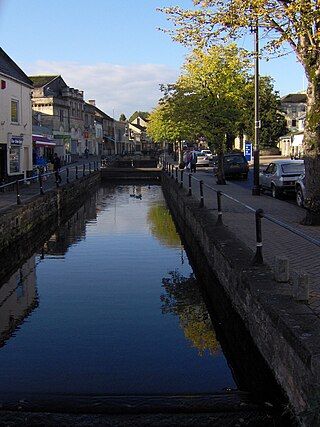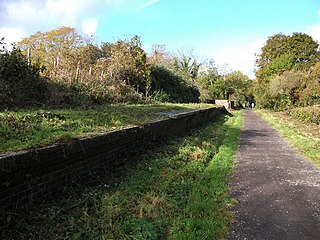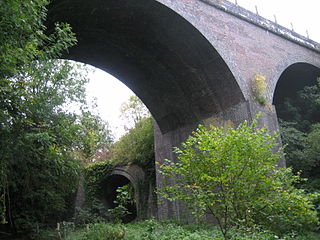
Midsomer Norton is a town near the Mendip Hills in Bath and North East Somerset, England, 10 miles (16 km) south-west of Bath, 10 miles (16 km) north-east of Wells, 10 miles (16 km) north-west of Frome, 12 miles (19 km) west of Trowbridge and 16 miles (26 km) south-east of Bristol. It has a population of around 13,000. Along with Radstock and Westfield it used to be part of the conurbation and large civil parish of Norton Radstock, but is now a town council in its own right. It is also part of the unitary authority of Bath and North East Somerset.

The Avon Valley Railway (AVR) is a standard gauge heritage railway in South Gloucestershire, England, operated by a local group, the Avon Valley Railway Company Ltd. The 3-mile (5 km) heritage line runs from Oldland Common to Avon Riverside. It follows the Avon Valley southeast from Oldland Common to Bitton and then it runs alongside the River Avon from Bitton towards Saltford.

The Somerset and Dorset Joint Railway, was an English railway line jointly owned by the Midland Railway (MR) and the London and South Western Railway (LSWR) that grew to connect Bath and Bournemouth, with a branch in Somerset from Evercreech Junction to Burnham-on-Sea and Bridgwater. Strictly speaking, its main line only ran from Bath Junction to Broadstone, as the Bath to Bath Junction section was wholly owned by the MR and the Broadstone to Bournemouth section was owned by the LSWR.

Shillingstone is a village and civil parish in the Blackmore Vale area of north Dorset, England, situated on the River Stour between Sturminster Newton and Blandford Forum. In the 2011 Census the civil parish had 479 households and a population of 1,170.

The Gartell Light Railway is a privately run narrow gauge railway located at Yenston in the Blackmore Vale, south of Templecombe, in Somerset, England. It operates a 2 ft narrow gauge railway running for 3⁄4 mile (1.2 km), partly along the track of the old Somerset and Dorset Joint Railway. The railway has 4 stations - Common Lane, Pinesway Junction, Park Lane and Tower View.

The Somerset & Dorset Railway Heritage Trust (S&DRHT) is a heritage railway line in Somerset, England, that runs on a restored section of the Somerset and Dorset Joint Railway. The line is approximately 1 mile long and operates from Midsomer Norton South.

The Somerset Coal Canal was a narrow canal in England, built around 1800. Its route began in basins at Paulton and Timsbury, ran to nearby Camerton, over two aqueducts at Dunkerton, through a tunnel at Combe Hay, then via Midford and Monkton Combe to Limpley Stoke where it joined the Kennet and Avon Canal. This link gave the Somerset coalfield access east toward London. The longest arm was 10.6 miles (17.1 km) long with 23 locks. From Midford an arm also ran via Writhlington to Radstock, with a tunnel at Wellow.

Midford is a village approximately 3 miles (5 km) south-south-east of Bath, Somerset, England. Although relatively small, it extends over 2 counties, is part of two unitary authorities and is part of five parishes. Although all five parishes extend very near to the village centre, most of the residents reside in the parish of Southstoke and are part of the Bath and North East Somerset unitary authority.

Combe Down Tunnel is on the now-closed Somerset and Dorset Joint Railway main line, between Midford and Bath Green Park railway station, below high ground and the southern suburbs of Bath, England, emerging below the southern slopes of Combe Down village.

Midford railway station was a single-platform station on the Bath extension of the Somerset and Dorset Railway, just to the north of the point where the double-track became a single track. It served the village of Midford. The station was closed with the rest of the line in March 1966 under the Beeching axe, though it had been unstaffed for some years before that.

Midsomer Norton railway station was a station on the Somerset and Dorset Joint Railway between Bath Green Park and Shepton Mallet. It served the town of Midsomer Norton in the English county of Somerset, which was also served by a second station known as Midsomer Norton and Welton railway station on the Bristol and North Somerset Railway.

Chilcompton railway station was a station on the Somerset and Dorset Joint Railway at Chilcompton in the county of Somerset in England and opened on 20 July 1874. Originally the station consisted of a single platform on the Down side with a station building and possibly also a siding. In 1876 a loop and second platform were opened on the Up side, controlled from a 16-lever signal-box on the Down platform, which also controlled access to the goods yard. The line to Binegar was doubled in 1885. In 1886 the line to Midsomer Norton and Radstock was doubled and a replacement 13 lever signal box provided just beyond the Binegar end of the Up platform. The station closed to goods in 1964 and the signal-box closed in 1965; passenger services were withdrawn when the SDJR closed on 7 March 1966.

The River Somer is a small river in Somerset, England.
The Bristol and North Somerset Railway was a railway line in the West of England that connected Bristol with Radstock, through Pensford and further into northern Somerset, to allow access to the Somerset Coalfield. The line ran almost due south from Bristol and was 16 miles (26 km) long.

Spetisbury railway station was a station in the English county of Dorset. It was located between Blandford Forum and Bailey Gate on the Somerset and Dorset Joint Railway. The station consisted of two platforms, a station building, signal box and shelters.

Shillingstone railway station was a station on the Somerset and Dorset Joint Railway (S&DJR), serving the village of Shillingstone in the English county of Dorset. Shillingstone is the last surviving example of a station built by the Dorset Central Railway.

Midford Halt railway station was open between 1911 and 1915 in Somerset, England. The halt was on the Limpley Stoke to Camerton railway that formed part of the Great Western Railway's development of the former Bristol and North Somerset Railway, and which followed the former Somerset Coal Canal. The line was only open to passenger traffic for seven years in all, from 1910 to 1915, and from 1923 to 1925; Midford Halt opened a year late and then did not reopen for the second period.

North Dorset Railway is a heritage railway based at Shillingstone railway station on the former Somerset and Dorset Joint Railway in the United Kingdom.

Midsomer Norton and Welton was a station on the Great Western Railway line from Bristol to Frome via Radstock. The station was originally named just Welton, being located in a valley at the village of Welton, Somerset. It closed to passengers in 1959 with the closure of the line to passenger traffic, and to goods in 1964.

Norton House was a mansion in Midsomer Norton, Somerset. It was built around 1789 by the Savage family, investors in mines in the Somerset Coalfield. It was demolished in 1937-8 to make way for housing but several features from the house and its estate survive to this day.





















